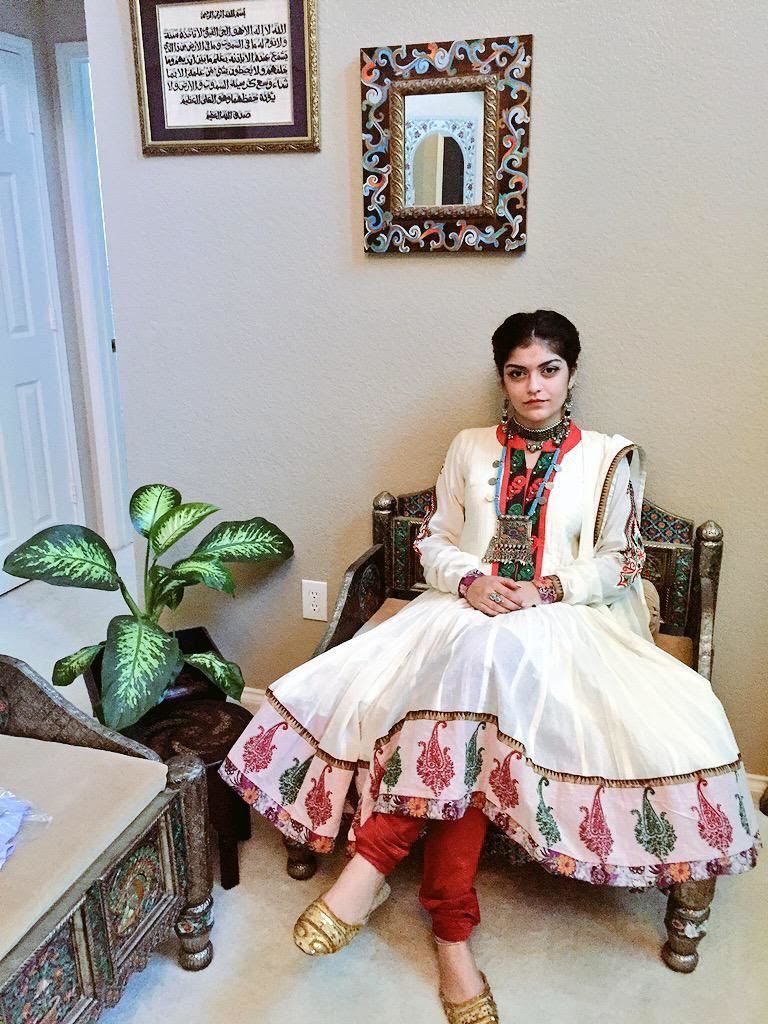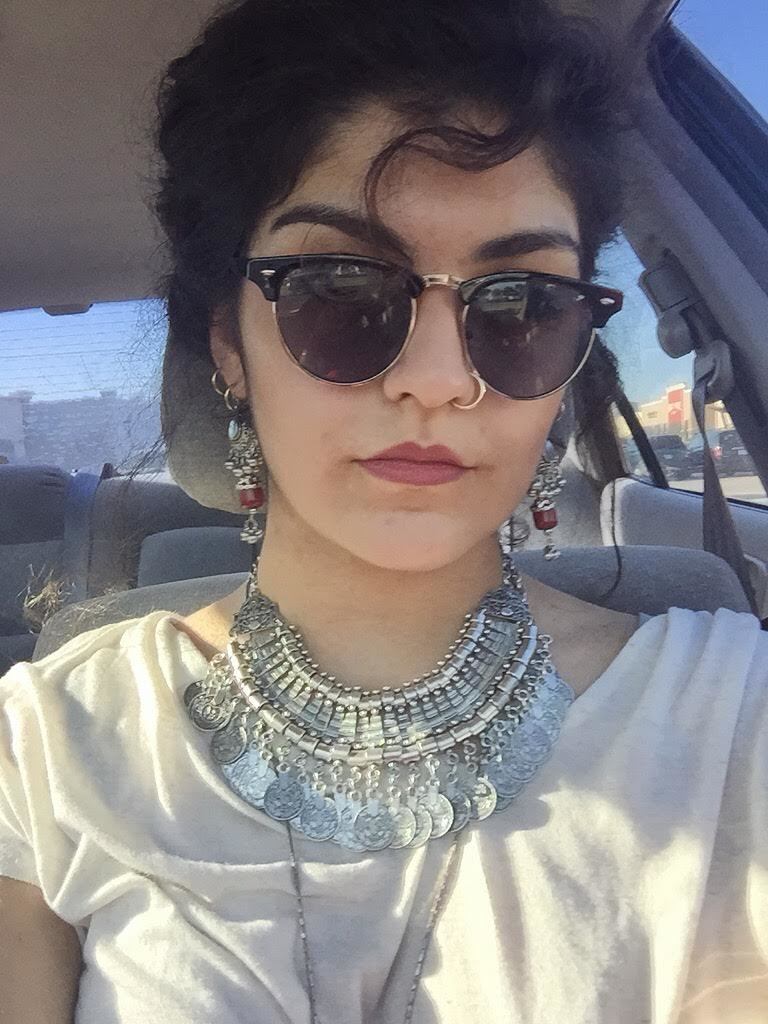Suraiya (or @iranikanjari as she’s known on Twitter) became a social media sensation over the festive break after posting a few casual snaps of herself, wearing a t-shirt and underwear. The images show her stomach, thighs and natural body hair, and are accompanied by the lols caption, “walmart underwear vibes”.
walmart underwear vibes pic.twitter.com/wo66OQGIdo
— pakola papi (@iranikanjari) December 24, 2015
The 18-year-old student from Dallas, Texas — who is of Iranian, Indian and Pakistani heritage — had posted body positive selfies before, but nothing that generated such an explosive, and international reaction. Despite receiving a lot of negative and ignorant comments from Twitter trolls, Suraiya was supported by feminists praising her radical action. Women around the world thanked her for showing them that their body is beautiful too, just the way it is.
Not only did Suraiya keep the picture online, she engaged with many of the haters. She answered calls for her to “buy a razor” with tweets that ranged from a simple and sassy, “No,” to longer, more detailed dissections of beauty expectations. Her sentiments sparked a wider conversation about sexism, whitewashing, cultural appropriation and the power of social media activism. i-D caught up with Suraiya to get her take from the eye of a social media storm…
What made you post the “Walmart underwear vibes” selfies?
I was really just feeling cute and was loving my body shape. I know I’ve got body hair and I know I usually get hate for this stuff, but the photos were among the least provocative I’ve posted. So the reason really was: ‘I’m feelin’ myself.’
Did you have any idea when you posted them how controversial they would be?
No way. When I checked the activity on it and saw that after fighting all those absurd men it was hitting 1,000+ faves, I screamed. I haven’t stop screaming, none of this was planned.
There has been a huge, global reaction online. How has it differed across genders, cultures or other groups?
Oh God. I mean, the hate was usually from men, and sadly men of color. But I’m used to hate from men in my community; like anyone from the Southeast Asian diaspora, I’m used to that. But men from any other community commenting shocked me; it was a breadth of men who were commenting absurd things, and that made it even more crazy. Any woman who commented [negatively] was generally of western origin. There were some brown girls here and there, but it was predominantly women who have just never had the genetic issue, so it must have shocked them? I can’t think of another explanation besides the beauty industry being geared towards western standards. Anyone who accepts those standards assumed I’m gross. The majority of my support came from brown girls who saw me and related, which is amazing. I have never been supported in such a way. The outpouring of love was beyond my capacity to grasp, if I’m being honest. Like, here are these girls, girls just like me, idolizing me. It made all the hate worth it.

Your family didn’t take your new found social media fame too well, but you said you convinced your mom that you were empowering women –what did you say?
[My mom] had an emotional reaction at first, screaming in Hindi that I took the family honor away. Then I just sat down and was like, “We’re talking like adults.” I explained: firstly, I’m more clothed than I would be on the beach; secondly, this is all to help women like me and her. She got it, and we’re fine. Dad… doesn’t know. And that’s cool. Like, dads are dads and they often live in ignorance about daughters. I think he wouldn’t care, though. I was scared that if he did know, his reaction would be more emotional and he would try to ship me back home. The thing about parents — brown parents in particular — is that the switch-up is polar: one second they can be fine with you and the next they’re literally threatening to move you back to Mumbai. So I just didn’t know how that would have gone. It never came to that. So I guess everything is fine. They are my parents after all.
Why do you think body hair is such a contentious point in the drive for body positivity, even amongst feminists?
Rhetorically speaking, I feel hair and hair growth function as incredible creative material. It’s a topic that can be understood and translated beyond linguistic barriers. There is so much you can do with the ‘idea’ of hair in a literary sense, and that’s what makes it an amazing rallying cry. My 7th grade English teacher told me, “The winner of the argument is the one who defines the terms,” and I live by that. So when people started defining hair as gross, I redefined the terms for myself: I am not hairy, I see myself as a garden, as a forest, as the geography of my homeland. What those men see as appalling, I redefined to be a garden so beautiful Epicurus dare enter it — something to put Eden and Babylon to shame. Because of this, their comments really do mean nothing.
You’ve been vocal about white culture’s love (appropriation) of brown culture, but not brown bodies. What needs to change?
When you come at my body hair and call me Chewbacca — you aren’t just making fun of me. You’re making fun of your eyebrow lady, the woman you hire to do your henna, the women who stitch your Forever 21 tunics, your Uber driver, the dude who’s homework you copy, the man who makes the chicken tikka at your favourite Indian restaurant, your doctor, the engineer who built the highway you take to work. When you make fun of me, you make fun of ALL of us. You invalidate ALL of us. You invalidate people from the Arabian Peninsula to Myanmar — and that is repulsive.
Brown people will not look like you. They should not be expected to look like you. And the fact that this has to be said is beyond me. If you even want a seat at the table of our culture — if you want to even begin to argue you deserve to participate in anything we do — you better accept quick that we will not fit your standard of beauty. We do not need to, we have our own. There are too many people out there who are willing to steal the bindi off my head so they can wear it, all while throwing a razor in my face to shave. What needs to change is simple: people outside our diaspora need to realize that positive convergence only occurs through honest conversation. The honest conversation here is that we were never meant to fit the western mold. I’m very proud to say we don’t need to fit that mold. And there are millions of brown girls out there who are fighting to break it — and we won’t lose.
Is social media helping to break down problematic body expectations?
I believe so. The process is slow and messy, but in March I will have been on Twitter for three years, and I can honestly say I have seen opinions take a 180 turn. Social media activism does work. The only bone to pick for me is that often there are so many issues to discuss we get bogged down in how to do so while keeping everyone in a safe space. Of course, social media itself is an organism that remains in flux. But it works; it definitely works.
Who are your favorite body positive social media stars?
I have to give a shout out to Dounia and Minahil for being my body posi moms on the site. Two intellectual, beautiful and unapologetic women of color who inspire me daily. Also Dark Matter — who I follow on Facebook — has been really influential in how I fit my body positivity into other fields of social awareness. But really all my friends on Twitter have been beyond beautiful and helpful. Every single person who supported me out there — thank you, a thousand times thank you.
